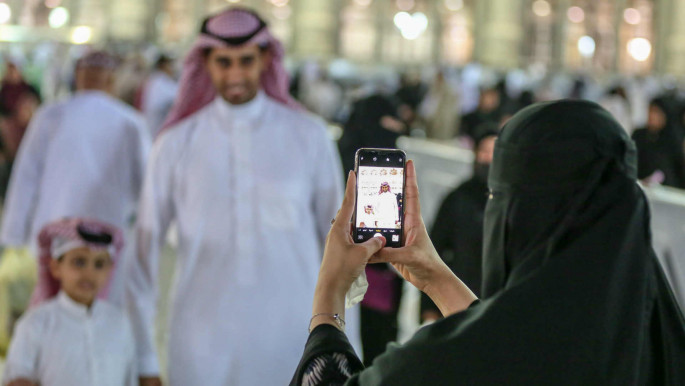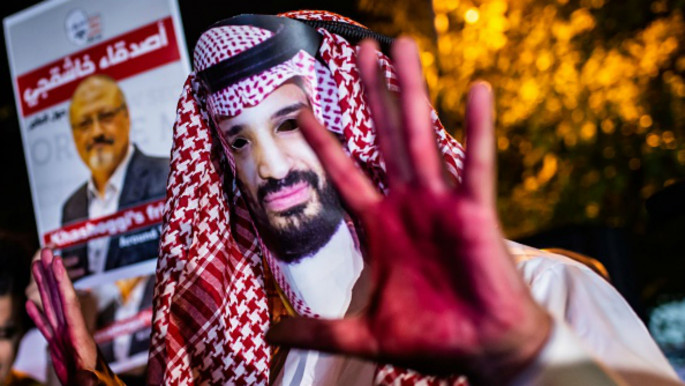New nationalism on the rise in Saudi Arabia
Through the 20th century, the Saudis refused nationalism as a threat to the monarchy and rather relied on old tribal connections and powerful influences of religion.
Saudi rulers feared that the absolute monarchy system would be greatly challenged with the spread of pan-Arab nationalism and identification with the nation-state rather than with the monarchy itself.
Martin Kramer, the Koret Distinguished Fellow at The Washington Institute for Near East Policy and authority on the history and politics of the Middle East, reminds, however, that no one has claimed that a "Saudi nation" actually exists.
"There is a Saudi royal family and a Saudi monarchy. There is a Saudi nationality in a legal sense, but not a Saudi nation in the moral sense. Sovereignty has not rested with the people, but with God, delegated to an alliance of the religious establishment and the Saudi house," he told The New Arab.
But old social contract and religious identity have become incompatible with the 21st-century challenges and the current leadership's vision outlined in an ambitious plan to reform the country – Vision 2030.
The state leadership is instead promoting a new ideology, carefully mobilising the public while searching to legitimise actions of the young Crown Prince Mohammed bin Salman (MbS) and pave the road to these announced reforms.
The rise of nationalism
The rise of nationalism in Saudi Arabia is not a unique phenomenon, as a similar process has been developing in other Gulf states.
 |
|
| Read also: What reform? The perils of the Saudi 'public decency' law |
According to Joseph A. Kéchichian, a senior fellow at the King Faisal Center for Research and Islamic Studies in Riyadh, Saudi Arabia, "all nationalisms tend to concentrate both on reality and idealism. The consolidation of Saudi nationalism is nothing new and will probably include substantial changes as well as good intentions that aim to introduce dramatic changes."
The nation-building through promoting of nationalism has been introduced as a solution that would cope with new challenges and preserve the monarchy.
But the project may face obstacles down the road. Many observers point out that if a future Saudi nation is to be founded on traditions of Najd – where the capital Riyadh is and where the royal family is located – and ignores other local identities, the new leader may encounter some serious opposition.
This is especially the case with Shia-dominated Qatif in the Eastern province, Asir in the southwest, as well as Hejaz with holy cities of Mecca and Medina.
Top-down model
"In the case of Saudi Arabia, Heir Apparent Muhammad bin Salman is determined to bring his nation into the 21st century without – and this is critical to underline – altering fundamental norms," Kéchichian continued.
So, according to him, the aim of MbS is not to reduce the role of the traditional religious establishment but to update it into something more relevant to the times.
He explains that MbS is determined to uphold age-old norms, not to eliminate them, but insists that these are compatible with modernisation, or must be.
 |
The aim of MbS is not to reduce the role of the traditional religious establishment but to update it into something more relevant to the times |  |
Remarkably, the overwhelming majority of Saudis, who are devout believers, agree with him.
"This is the heart of his vision and, truth be told, the source of his strength," Kéchichian, noted.
Indeed, MbS actually just continued and amplified the narrative initiated by his predecessors, King Fahd (1982-2005) and King Abdullah (2005-2015) who both introduced secular identifications within the collective Saudi identity in order to strengthen domestic legitimacy.
However, Kramer notes that a true nationalism would shift the locus of sovereignty to the Saudi nation. The kingdom's government would then be exercising its authority not over the people of Saudi Arabia, but on behalf of the people.
He recalls that in Europe, the rise of such nationalism in Europe during the 19th century eroded the authority of the divine-right monarchy and strengthened popular demands for a republic. It could be the same case in Saudi Arabia, he adds.
Although it is hard to forecast the final outcome of Saudi nation-building, Kramer mentions the possibility that Saudis could end up with a "hybrid system, in which a representative but a loyal body of Saudis would replace the religious establishment as an ally of the monarchy. The monarchy would dominate this alliance and use it to legitimise its continued rule."
In the medium term, however, it might help to accelerate the political modernisation of Saudi Arabia, and even modernise the monarchy.
Loyalty and obedience first
But in order to succeed, the new leadership demands loyalty and obedience.
 |
|
| Read also: Mohammed bin Salman's waning influence |
Kéchichian states that all leaderships demand loyalty and obedience and there are no exceptions to this, even democracies are eager to channel various demands for reforms through complex legal systems that are beyond any citizen's capabilities to absorb.
In fact, he continues, the abundance of law, which requires specialised knowledge, imposes its own rules on any citizen.
But emerging nationalism brings also a greater engagement of the ruling subjects. Sooner or later this would open up the questions about wider responsibilities and political representation.
For Kéchichian the key question for Riyadh is how to channel popular demands into effective reforms so that citizens continue to back the monarchy. This is the case today as the overwhelming majority of Saudis support the ruling establishment.
 |
The overwhelming majority of Saudis support the ruling establishment |  |
The dark side of hyper-nationalism
The new leadership has however also clearly signalled that any disagreement with new ideological course and leadership would not be welcomed.
For example, the secretary-general of King Abdulaziz Center for National Dialogue, openly declared that those who do not defend the nation would simply be marked as "traitors." The word has recently been used often to label, scare or discredit political opponents.
This was especially evident during the "purge" in late 2017 when dozens of royal family members, officials and business executives were detained under MbS's ruse of anti-corruption. They faced allegations of money laundering, bribery, extorting officials and taking advantage of public office for personal gain.
However critics said the 'anti-corruption' push was political and meant to force many of these leading figures to hand over their assets to the crown prince and his cronies.
This purge has thus contributed to insecurity and fear among opponents of MbS's rule.
Saudi first
While curbing the hard-core Islamic line has been welcomed by domestic liberals and foreign observers, the emergence of hyper-nationalism in Saudi foreign policy behaviour has created controversies and has been met with concern.
It has also been identified as one of the main causes of regional turmoil and perceived as a great threat by many of Saudi Arabia's neighbours.
The kingdom has expressed a forceful foreign policy in the region and beyond, attempting to spread its dominance on one hand, while aggressively responding to any criticism from abroad – even from its long-time partners or allies. This was apparent during the diplomatic tensions with Germany in 2017 and Canada one year later.
Finally, aggressive Saudi behaviour and hegemonic ambitions been have seen as the main cause for the ongoing Gulf crisis with Qatar.
Consequently, it could be much harder from now on to deal and solve regional problems and open issues due to this rise of nationalism, which has been visible in other countries in the region.
It is hard to predict what the clash of different nationalisms means for regional stability and for future cooperation in the GCC. But Kéchichian believes that Gulf States including Qatar "are allies and are likely to place higher interests above all else when their very existence may be threatened".
"There are at present sharp political and security differences with Qatar and Yemen but this will change and partners will reconcile," he adds.
However, pan-Arabism and pan-Islam were never driving forces of Saudi Arabia's policy, according to Kramer. "Riyadh has used both to bolster its own standing in the Arab and Islamic world. Even from the days of Ibn Saud, Saudi's foreign policy was all about Saudi Arabia first. This hasn't changed."
Stasa Salacanin is a freelance journalist who has written extensively on Middle Eastern affairs, trade and political relations, Syria and Yemen, terrorism and defence.





 Follow the Middle East's top stories in English at The New Arab on Google News
Follow the Middle East's top stories in English at The New Arab on Google News


